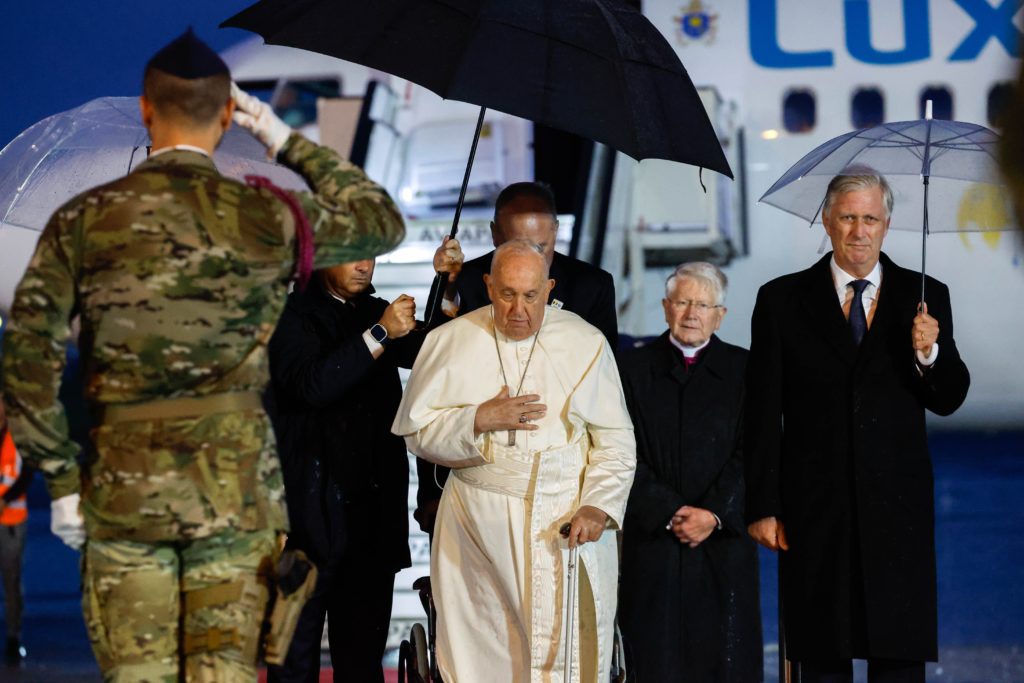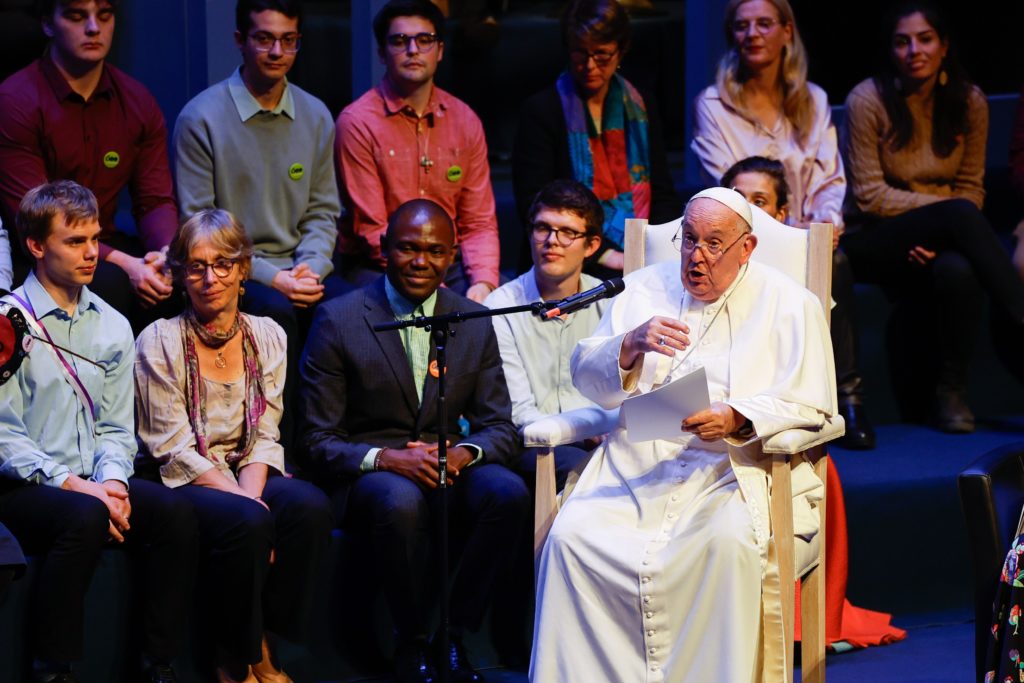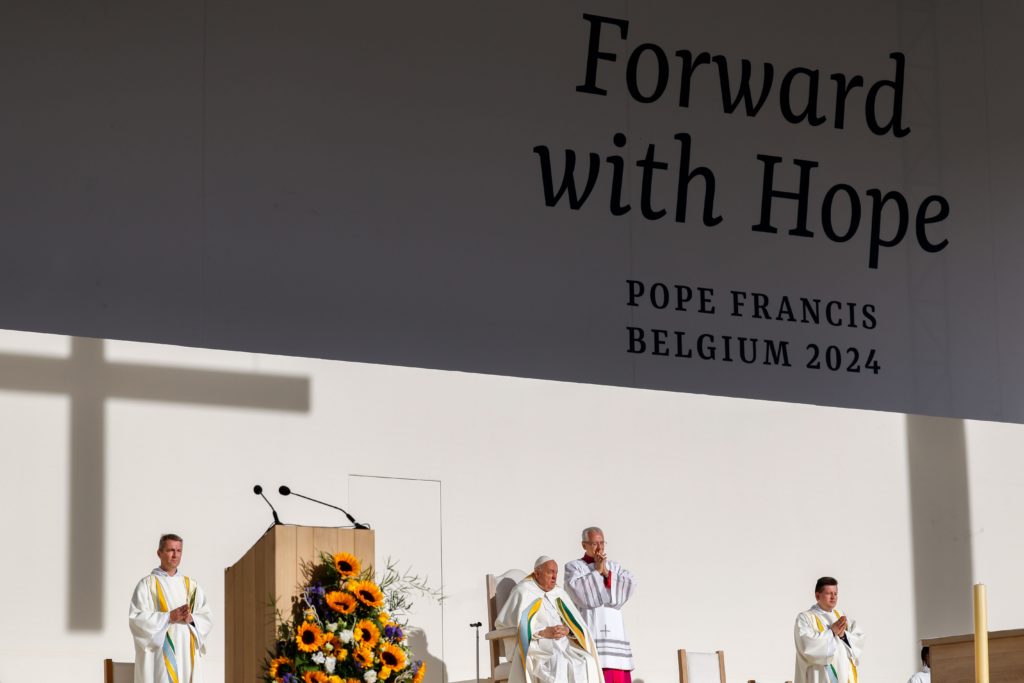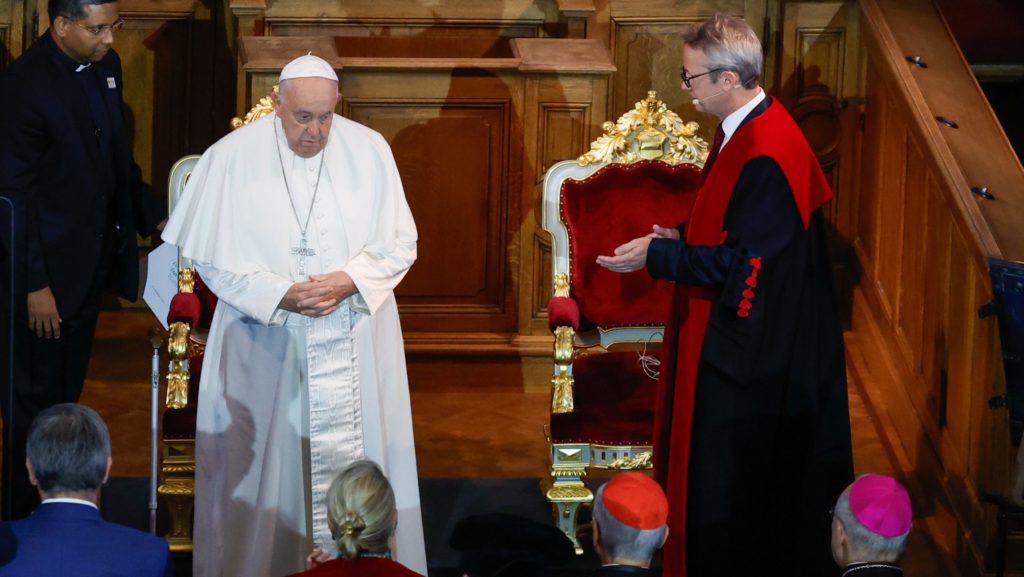ROME — College football fans are still buzzing from the Sept. 28 Alabama-Georgia game, widely hailed as an instant classic. Alabama jumped out to an early lead, but Georgia came roaring back and ’Bama had to score late to secure the 41-34 win.
Afterward, the consensus was that Alabama probably benefited from being tested rather than cruising to an easy win, on the grounds that you usually learn more from your struggles than your successes.
By that standard, Pope Francis’ Aug. 26-29 trip to Luxembourg and Belgium has to rank among the great learning experiences of his pontificate, as he was repeatedly tested by an ambivalent and, at times, even hostile public.
After a brief stop in Luxembourg, Francis arrived in Belgium Thursday night and experienced the less-than-rapturous climate beginning Friday morning.

The day began with Francis’ meeting with King Philippe and Queen Mathilde, followed by his encounter with Prime Minister Alexander De Croo, who’s currently acting as a caretaker until a new government can be formed. De Croo issued a highly unusual public reprimand of the pontiff over the Church’s clerical abuse scandals.
Belgium has been especially hard hit by the clerical abuse scandals, including the notorious case of former Bishop Roger Vangheluwe, who stepped down after admitting to abusing minors, including two of his own nephews.
“We cannot ignore the painful wounds that exist in the Catholic community and in civil society,” De Croo told the pope. “Numerous cases of sexual abuse and forced adoptions have undermined trust.”
“You’ve committed to a just and fair approach, but the path is still long,” De Croo told the pope. “Ministers of the Church work with conviction and charity, but if something goes wrong, cover-ups are unacceptable.”
“To be able to look to the future, the Church first must come clean about its past,” he said.
De Croo’s scolding, however, turned out to be mere prologue to the day’s real tension.
Later Friday, Francis visited the Catholic University of Leuven, one of two Catholic universities in Belgium celebrating their 600th anniversary. While there, rector Luc Sels used the occasion to press the pontiff both on the ordination of women as priests and also on inclusion of the “LGBT” community.
“Wouldn’t the Church be more cordial if it gave women a more prominent position, including in the priesthood”? he asked — knowing full well, of course, the pope has already given his answer, so it was more a rhetorical query.
Sels also called for a more open position on issues of gender and sexuality, saying “the Church throughout the world is called to bring recent scientific discoveries into dialogue with theology,” and added that Catholicism should be wary of “once and for all” answers.

Francis may have thought he could short-circuit such criticism during his own talk at Leuven by addressing the issue of women in the Church head-on, but as things turned out, he instead added fuel to the fire.
“What characterizes women, that which is truly feminine, is not stipulated by consensus or ideologies, just as dignity itself is ensured not by laws written on paper, but by an original law written on our hearts,” the pope told the crowd of faculty and students, in language that prompted the university to issue an immediate protest, calling the pope’s position a “deterministic and reductive position.”
“UC Louvain is an inclusive university and committed to the fight against sexist and sexual violence. It reaffirms its desire for everyone to flourish within it and in society, whatever their origins, gender, or sexual orientation,” the university said. “It calls on the Church to follow the same path, without any form of discrimination.”
There were reminders of the tension also during the pope’s concluding Mass in Brussels, when women dressed all in white would stand in silent protest every time a woman delivered a reading or a prayer, objecting to the exclusion of women from the priesthood.
In some ways, organizers of the trip didn’t do the pope any favors either. It turned out that the closing song chosen for the papal Mass, lyrics to which were printed in the Mass booklet distributed to everyone in the stadium, was written by the recently deceased priest Father Paul Schollaert, who was found guilty of sexual abuse after his death.
Organizers were compelled to display a message on the Jumbotrons at the Mass which read, “The recent revelations about the composer of the closing hymn chosen for this celebration are shocking and hurtful. We have therefore changed the choice.”
In response to all this, Francis may not have done much to calm things down on his return flight to Rome, when he bristled in response to a question from reporters about his language on women. He later equated courage to wearing pants, a phrase unlikely to do much to charm advocates of gender equity and women’s rights.

In a sense, the blowback Francis faced in a country rocked by one of the most intense clerical abuse crises in western Europe — and in one of the most secular and socially progressive societies on earth — shouldn’t have been a surprise.
Amid the turbulence, however, Francis did appear to lay out a template for engaging such a milieu, even if, in the moment, it got a bit lost amid the rattle and hum of controversy.
Acknowledging that secularism creates a crisis for the Church, Francis insisted that doesn’t mean turning out the lights.
“We have moved from a Christianity located within a welcoming social framework to a ‘minority’ Christianity, or better, a Christianity of witness,” he said. “This requires the courage to undertake an ecclesial conversion for enabling pastoral transformations that concern our habitual ways of doing things and the language in which we express our faith, so that they are truly directed to evangelization.”
Speaking to bishops, priests, deacons, consecrated persons, seminarians, and pastoral workers in Belgium, Francis said priests must play a special role in this transformation.
“Priests need courage in order to be priests who are not just preserving or managing a past legacy, but pastors who are in love with Jesus Christ and who are attentive to responding to the often implicit demands of the Gospel as they walk with God’s holy people,” he said.
As for the leitmotif of the Church in a sometimes hostile culture, Francis, quoting his predecessor Pope Benedict XVI, said it must be joy.
“Long before he became pope, Joseph Ratzinger wrote that one particular rule of discernment is, ‘Where joy is lacking, and humor dies, not even the Holy Spirit remains […] and vice versa: Joy is a sign of grace’,” he said.
Perhaps now that the dust has settled on perhaps the second most contentious trip of his papacy, trailing only Chile in 2018, Francis will reflect more deeply on this theme — because, after all, he got pressed over the weekend, and it’s often just such challenges that stir creativity.

